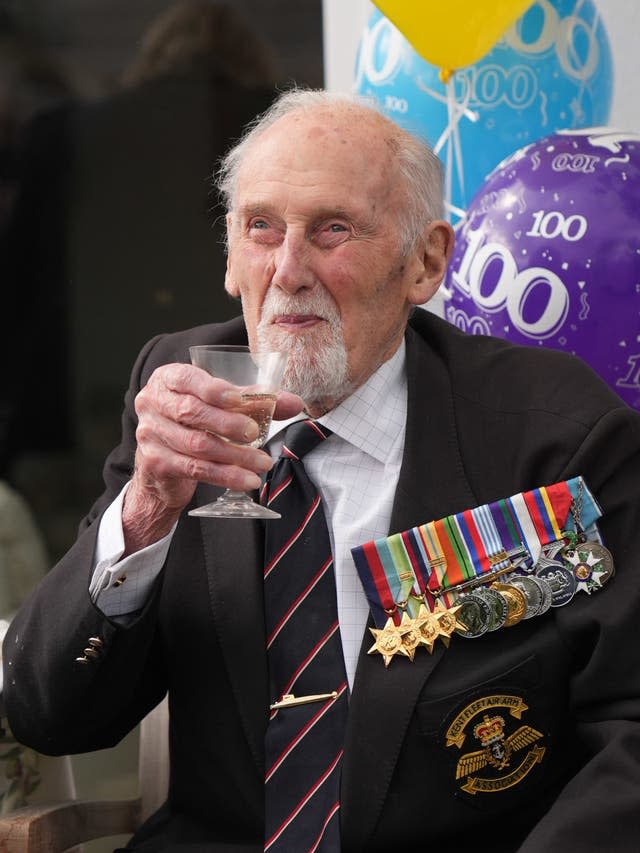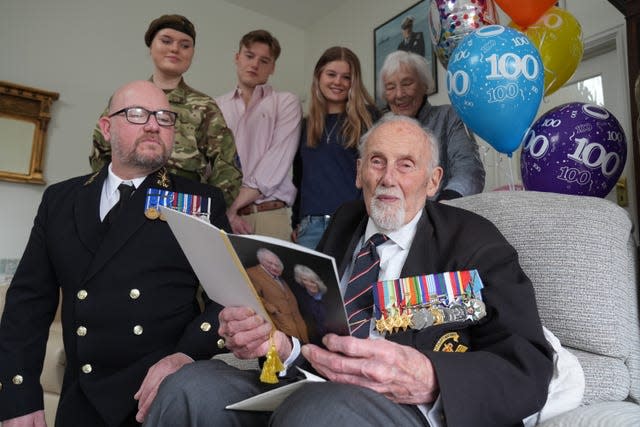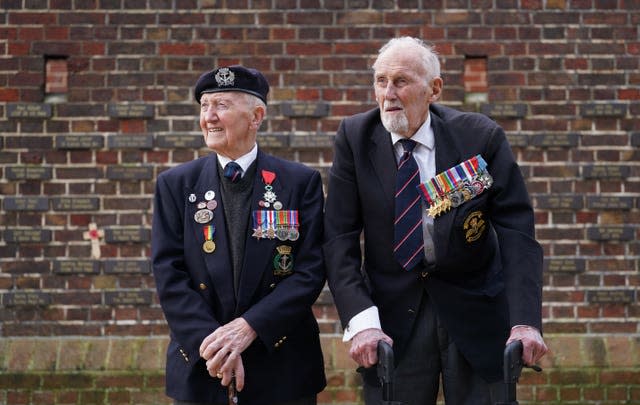D-Day veteran John Roberts celebrates his 100th birthday

One of the UK’s remaining D-Day veterans has been celebrating reaching his 100th birthday which he puts down to “keeping very fit” all his life.
Family and friends gathered at the home of John Roberts and his wife Gillian in Whitstable, Kent, as he opened his birthday card from the King and Queen.
The great-grandfather joined the Royal Navy at the age of 13 and served until 1978 having reached the rank of rear admiral.
On D-Day, as a 20-year-old sub-lieutenant, he was serving aboard the destroyer HMS Serapis at the front of the convoy arriving at Sword beach at 7.30am with the ship remaining to fire on German positions along the coast for 11 days.
After the war he went on to become a fighter pilot, flew a Sea Fury in Korea, captained aircraft carrier HMS Ark Royal and headed the Fleet Air Arm, before retiring after a 40-year career.
On reaching the milestone birthday, he told the PA news agency: “I have never felt like it before, last night I couldn’t believe it was going to happen, and my wife and I stayed up until midnight just to make quite sure I did make it.
“It’s astonishing and there are so many people who have come to see me opening the card from the King and the Queen.”
Explaining the secret of his long life, he said: “I grew up in North Wales and at school I was always good at games so I have never smoked in my life and I have always tried to keep very fit.
“There was a tall mountain behind where we lived in Wales and I used to climb that about every third day, it was 2,500ft high, and I think by keeping fit all my life it has helped me get as far as I have done.”

Mr Roberts said his memories of D-Day remained very clear and added: “I remember it very well because my ship HMS Serapis, a destroyer, we escorted the minesweepers that had to sweep the English Channel to Normandy because the Germans had laid thousands of mines.
“A huge bang and the destroyer next to us was torpedoed by a German e-boat that happened to be coming out anyway as a routine and to their astonishment they discovered the armada coming.
“They hit a destroyer manned by Norwegian sailors who had escaped from Norway and I thought it was rather sad that a Norwegian ship should be the first one to be sunk.
“We got closer, then at about 7 o’clock we started bombarding the coast and there were cruisers doing the same, battleships even further back and thousands of flying fortresses going along the beach dropping thousand-tonne bombs.
“It was the most amazing sight. It was so astonishing I have never forgotten it and I haven’t forgotten those poor Norwegian sailors who died so far from their homeland.
“I felt sorry for the soldiers having to go ashore but the soldiers were quite pleased because it had been a little bit choppy crossing the Channel and a lot of them were seasick so they were only too pleased to get on dry land again.”

Mr Roberts said that he believed that remembering those who lost their lives at D-Day and in previous wars was important to help prevent future conflicts.
He said: “I suppose now what worries me a little bit is that we almost seem to have more wars raging in the world than there were in 1944 which is very sad as I have children, grandchildren and even great-grandchildren and it’s horrifying to think that when I’ve gone they might be confronted with wars.
“We want to make quite certain they remember it but Hitler was in World War One and he was in the trenches and yet it was him who really started World War Two and you would have thought he would have experienced the horrors and the last thing he would do would be to begin another one and Putin, you can’t trust Putin.”
His daughter, Clare Felton, said: “It’s a strange thing, this morning was the first time I stopped and thought about the fact that this is such a monumental milestone.
“My children, John’s grandchildren, were saying ‘This is really something, grandpa’s 100, can you believe it’.
“We are all delighted and it’s fantastic he’s in really good form today with lots of people here wanting to talk to him.

“He’s had a wonderful career in the navy and it’s wonderful that there are so many commemorations which means he can tell stories and tell the grandchildren what happened.
“All of these things are brilliant and we need to know them.”
In February, Mr Roberts’ role at D-Day was honoured along with 12 other veterans of the battle who had their names added to the Normandy Memorial Wall at the D-Day Story museum in Southsea, Hampshire.

 Yahoo News
Yahoo News 
